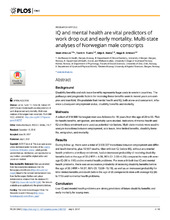| dc.description.abstract | Background: Disability benefits and sick leave benefits represents huge costs in western countries. The pathways and prognostic factors for receiving these benefits seen in recent years are complex and manifold. We postulate that mental health and IQ, both alone and concurrent, influence subsequent employment status, disability benefits and mortality. Methods: A cohort of 918 888 Norwegian men was followed for 16 years from the age of 20 to 55. Risk for health benefits, emigration, and mortality were studied. Indicators of mental health and IQ at military enrolment were used as potential risk factors. Multi-state models were used to analyze transitions between employment, sick leave, time limited benefits, disability benefits, emigration, and mortality. Results: During follow up, there were a total of 3 908 397 transitions between employment and different health benefits, plus 12 607 deaths. Men with low IQ (below 85), without any mental health problems at military enrolment, had an increased probability of receiving disability benefits before the age of 35 (HRR = 4.06, 95% CI: 3.88–4.26) compared to men with average IQ (85 to 115) and no mental health problems. For men with both low IQ and mental health problems, there was an excessive probability of receiving disability benefits before the age of 35 (HRR = 14.37, 95% CI: 13.59–15.19), as well as an increased probability for time limited benefits and death before the age of 35 compared to men with average IQ (85 to 115) and no mental health problems. Conclusion: Low IQ and mental health problems are strong predictors of future disability benefits and early mortality for young men. | en_US |

